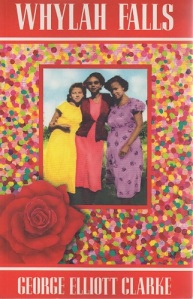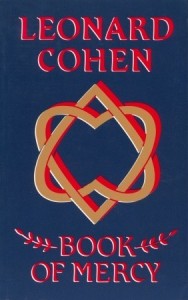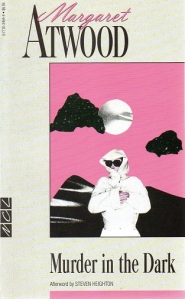Whylah Falls by George Elliott Clarke

Winner of the 1991 Archibald Lampman Award
Selected for Canada Reads 2002
I’ve written on this site before about my love of George Elliott Clarke. He is a master writer, a brilliant public reader and speaker, a top notch literary scholar, a genuine nice guy, and Toronto’s Poet Laureate. His writing is a mix of down-home Nova Scotia charm and rich African-Canadian historicism – which he dubbed “Africadian”. Whylah Falls is Clarke’s second book and one of signature works. This volume is the narrative of the residents of the fictional Nova Scotia black village of Whylah Falls, focusing primarily a young lady named Shelley and her immediate family. This book has the notable distinction of being selected for the first edition of Canada Reads held back in 2002 (defended by sci-fi author Nalo Hopkinson, finishing second only to the winning title In the Skin of a Lion) and still remains one of only two books of poetry to be featured on the competition.
Whylah Falls is a book of poetry but it is a mixed-genre book; it uses traditional narrative poems, prose poems, sermons, dramatic monologues, theatrical scenes, newspaper-style articles, letters, and photography. This collection is often referred to as a novel told through poetry, but I think a better description is a cycle of stories told through poetic forms as each section focuses on different groups of characters in the village.
This has become an important and landmark book in Canadian literature and is now solidly in the canon of Black Canadian writing. I read a selection of these poems in a Canadian Lit course at Saint Mary’s University in 2003 but I had never read the whole volume from start to finish despite the fact I’ve had a first edition sitting on my shelf for years (oddly enough the first edition cover is really terrible and both the 10th and 20th anniversary editions are much nicer). I really really wanted to love this book. I recently re-listened to Canada Reads 2002 and Hopkinson’s impassioned defense ignited a desire to immerse myself into Clarke’s best known world. But. But, in the end, I wasn’t blown away like I was hoping I would be. To this reader, Whylah Falls was just ok. And here’s why.
Firstly, I absolutely adored the love poetry in the two sections titled “The Adoration of Shelley” and I loved the whole section “The Martyrdom of Othello Clemence.” The imagery in the love poems was beautiful, sensual, and tastefully erotic and the narrative in “The Martyrdom” was powerful and vivid. Overall though, I was a little underwhelmed by a lot of the book. I think the primary problem was the huge cast of characters; I was continually lost and had to keep referring back to the Dramatis Personae. Unlike a novel or a play where there is ample narrative introduction and development of primary characters, this format didn’t really allow for that, so you are simply thrown into the middle of this dynamic little town (almost the identical problem I had with Sunshine Sketches of a Little Town).
I want to be clear that my rating of “just ok” doesn’t mean that I didn’t like the book. The quality of writing was very high and the innovative nature of the volume was superb. Ultimately though, Whylah Falls didn’t grab me the way Execution Poems did. Maybe I was just the wrong audience or I read the book at the wrong time. All that being said though, this is still one of the most important books in contemporary Canadian literature and maintains an important place in African Canadian culture.
Book of Mercy by Leonard Cohen

Leonard Cohen recently released his 13th studio album, Popular Problems, his best release since Various Positions in my humble opinion. So, needless to say, I have been listening to lots of Cohen’s music lately, reconnecting with old favorites and grooving to his hearty baritone rhythms. Obviously I decided it was a good time to read some Cohen. His bibliography is quite extensive, likely more so than most CanLit fans realize: eight original books of poetry, two novels, one collection of selected poems (for which he won, and subsequently refused, the 1968 Governor-General’s Award for Poetry), and one anthology of selected poetry, songs and prose. I haven’t actually read a lot of Cohen’s works; other than a few selected poems in Canadian literature classes, I’ve only read two of his books – his debut collection Let Us Compare Mythologies and, about 10 years, his infamous novel Beautiful Losers. I was up for a challenge this week, so I chose the 1984 book Book of Mercy.
Book of Mercy is collection of prose poems that take the form of devotional “contemporary psalms.” I have always struggled with prose poems and even more so with deeply religious writing, so I knew going into this collection that it would be a tough read. This collection, while frustratingly difficult, was an enjoyable and interesting read. If you’re familiar with either Cohen’s writing or music, you will recognize many of the themes and motifs present in almost all of the poems, especially if you imagine Cohen himself reciting them to you with his haunting deep voice.
All 50 of these prose poems are steeped in Judeo-Christian imagery and Biblical references – to the extent that someone unfamiliar with the basics of the Old Testament would likely be lost. Frankly, if you were to present these to a quality 4th year literature major, they would likely think these are translated 14th century Middle English devotions, not poems from a Jewish Canadian written in 1984. Overall, I would use one word to describe Book of Mercy: sad. The speaker is writing from a place of pain, spiritual torture, and religious uncertainty. At various points, the writing is desperate, angry, dark, but it is always gripping and, above all, sincere. Leonard Cohen is an extreme example of poetry being inseparable from the poet and this particular collection is case-in-point why.
Book of Mercy is not for the casual reader of poetry. It is difficult, confusing, and filled with obscure references. I read more poetry than most, I have a degree in literature and I have studied English at the graduate level, and still, I struggled greatly with this book. But, that is not to say this is a title to be avoided. If you’re a fan of Leonard Cohen, it is a fantastic example of what makes him tick. Just know that you’re not alone when you shake your head and mutter “huh?”
Local News by Glen Downie

One thing that Canadian writers certainly do well is prose poetry, that contradictory hybrid of the poem and the very short-story. Glen Downie’s 2011 collection Local News is a collection of prose poems that explores the everyday world all of us. I was attracted to this volume because of my interest in the genre, not necessarily the subject matter. The book is divided into four sections, each with its own focus. While I did find one particular section interesting, the one where the speaker is essentially pontificating on the decline of the small town, overall this book was a bit of a letdown.
Over the last number of years, I have read a lot of poetry that explores mystic properties of the old sofa in the living-room or the metaphysical character of a kitchen sink, etc; I think this trend of finding the magical in the meaningless has run its course and should be placed on the trash heap of English literature. The sequences “Home”, “Garage”, and “Mall” were filled with this kind of writing and it left a very forced and cold feeling. The poem “Pitch Fork” was a great example of this. Downie muses on the symbolic power that this simple garden tool radiates, invoking images of Satan and Poseidon. As the Freudian maxim goes, “sometimes a cigar is just a cigar.” Downie and other authors who are writing this kind of material need to realize that they are not Robert Browning and that picture hanging in the hallway is not their “last Duchess painted on the wall,/ Looking as if she were alive.”
The one redeeming section of the book was his look at the various small shops one would find in any generic dying small town in Canada. The characters that inhabit the shops and town, their ambiance, and how they are a throwback to a simpler time permeate this short sequence. This was the only part of the book that felt fresh, original, and passionate.
I get what Glen Downie was going for with Local News, his words simply fell on deaf and unsympathetic ears that were tired of hearing about how supernatural a mattress is. A for effort, C for execution.

